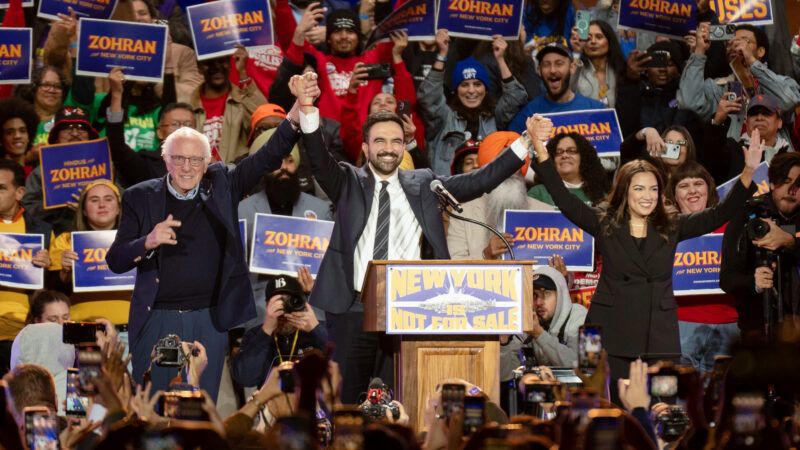The Democratic Thrill for Mamdani Is a Tell
What political insurgencies can teach us about major parties

There are any number of personal qualities that make New York mayoral front-runner Zohran Kwame Mamdani's political prominence seem improbable: his youth, his inexperience, his socialism, his terrible rapping, his statements of anti-Israel animus in the world's second-largest Jewish city. But the unlikeliest aspect to the State Assembly member's meteoric rise may be that an electoral pulse-quickener got anywhere near a position of prominence in a one-party polity.
The default Democrat in jurisdictions where Republicans are rare (they're outnumbered six to one in NYC) isn't a social-mediagenic semi-outsider; it's a dull-as-a-doorknob survivor of internal party jockeying. Think Bill de Blasio (not the Long Island one), or former California attorney general (and, gobsmackingly, secretary of health and human services) Xavier Becerra, not a junior Barack Obama wannabe.
The hapless mayor of Los Angeles, Karen Bass, went from South L.A. activist to perpetual 80/20 winner of a safe House of Representatives seat to the final four in Joe Biden's vice-presidential search before being anointed the Democratic mayoral nominee, surviving a close primary, then waltzing into office. The lucky winner of Biden's veepstakes, Bass's fellow female minority Kamala Harris (don't get mad at my descriptors; they were Biden's stated requirements), was a human word-salad generator who had faced all of one competitive general election before failing her way up to the Eisenhower Executive Office Building and being gifted with the 2024 Democratic nomination.
So you could almost forgive the media giddiness for Mamdani—Jon Stewart comparing the candidate to Jackie Robinson, the Pod Saves America bros gushing like 12-year-old girls talking about the Beatles in 1964, and so forth. It can be genuinely exciting, after years of unlovable establishmentarians like Biden, Harris, Hillary Clinton, and various vice presidential nominees named Tim, to encounter someone who can send the ol' thrill back up that leg.
Populist insurgencies, ever aided by the cutting edge of online culture, teach us important things about the major political parties they aim to overturn from within. The early rise of Howard Dean in the 2004 Democratic primaries indicated an anti-war fervor that would not be mollified by the milquetoast flip-floppery of John Kerry. (Barack Hussein Obama would be both the ultimate vindicator and decisive extinguisher of that lamented tendency on the left.) Ron Paul's rEVOLutions revealed similar anti-imperial urges on the right; they also helped midwife the initially robust fiscal conservatism of the Tea Party, whose anti-establishment candidates sent not a small number of thrills up the leg of this very magazine.
But the twin rises in 2015 of Donald Trump and Bernie Sanders as the most consequential—and thrilling!—outsider change-agents on our two 19th century political parties marked a new if by now pretty long era of explicitly anti-libertarian populism, in which apocalyptic rhetoric about America's doom goes hand in hand with magical thinking about policy fixes, and where facility with memes supplants fluency with policy.
There's a reason Mamdani has been raising hands at rallies with Sanders and Rep. Alexandria Ocasio-Cortez (D–N.Y.): He mixes Sanders's unapologetic socialism with AOC's youthful, multicultural toppling of a weary Democratic lifer. All three—quite unlike, say, New Jersey gubernatorial front-runner Mikie Sherrill, Pennsylvania Gov. Josh Shapiro, and even the eternally oleaginous California Gov. Gavin Newsom—are modern-day Democratic rock stars, able to fill at least small stadiums.
Mamdani's chief opponent, the disgraced former governor Andrew Cuomo, who has run one of the most lackluster campaigns I've seen this side of Cruz Bustamante, would be lucky to fill a Shake Shack. His selling proposition is not just hold-your-nose-while-voting; it's hold-your-nose-to-block-the-smell-of-your-rotting-husband-he-killed. If voting is best understood as a consumer good, you can see why New York Dems are gravitating toward the head-tilter: In a state represented in the U.S. Senate by Chuck Schumer and Kirsten Gillibrand, and a city whose last two mayors were the dreary de Blasio and the backlash-against-lefty-excesses Eric Adams, this may be Democrats' first affirmatively pleasurable experience at the ballot box since Obama.
For those of us on the outside of Team Blue, and for the other 332 million U.S. residents who don't live in (and are sick of hearing about) the Big Apple, here is the tell to watch out for in the coming days: Which prospective victory will Democrats be more fired up about Wednesday, Abigail Spanberger flipping the Virginia governorship away from the GOP, or Mamdani flashing his pearly whites in Gotham? The former is by far the more consequential indicator of the next two years in major-party competition; the latter tells you more about what's percolating under the Democratic hood.
If Mamdani wins the intra-Democratic beauty pageant, then hold onto your wallets. Populism, at least as channeled professionally through major-party politics, demands not results but proof of marketable concept. Why, you can win a high-profile election simply by smiling on social media and promising stuff even Saturday Night Live finds laughable? Get ready for a rent-freezing, billionaire-taxing, teachers union–fluffing, restorative justice–loving socialist near you. And keep the local U-Haul on speed dial.


Show Comments (83)